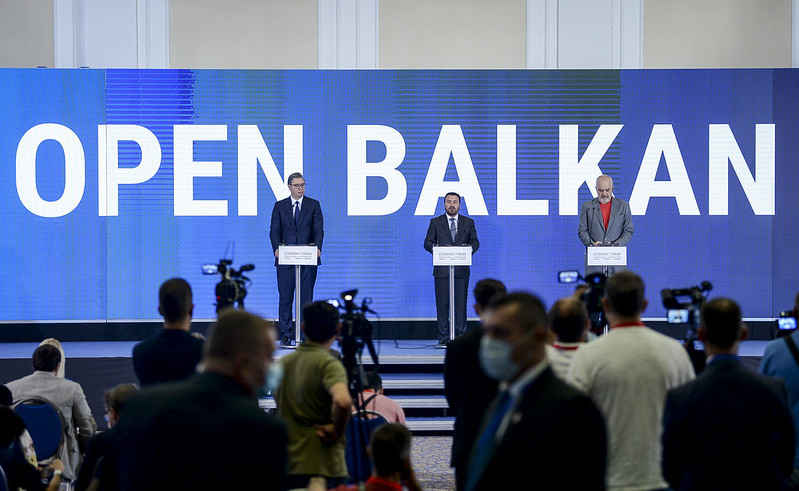
Despite progress in several areas of regional cooperation, the EU’s enlargement process remains slow. In the last seven years, the only progress was the European Council’s decision in March 2020 to open accession talks with Albania and North Macedonia, but negotiations have not yet started, mainly due to the conditions imposed on Albania and Bulgaria’s veto on North Macedonia.
In order to strengthen regional cooperation in the Western Balkans and to foster the integration of these countries into the EU, ‘The Berlin Process’ was established in 2014 on the initiative of Chancellor Merkel. This is an intergovernmental initiative launched by the German government in order to keep alive dialogue and attention towards the countries of the Balkan region that are still excluded from the European Union. The process was launched in reaction to the position of Jean Claude Junker who, upon becoming president of the European Commission in 2014, formalised the stalemate in accession prospects by declaring that there would be no further enlargements during his five-year term.
Over the years, the Berlin Process, in its intergovernmental dimension, has also been a catalyst for non-institutional forces: alongside the summit, meetings of civil society, researchers, young people and businesses have been organised to support a process of regional cooperation and progressive integration with the European Union at various levels[1]. There have been several summits and developments over the years but no concrete initiative to join these countries has yet been achieved given the different internal structural issues of these countries. Among the cooperation initiatives launched was the establishment of the South East European Transport Community, established by the treaty signed in Trieste on 9 October 2017, taking the place of the South East European Transport Observatory, a regional cooperation body established by the Memorandum of Understanding signed on 11 June 2004 between the governments of the six Balkan states (Albania, Bosnia and Herzegovina, Croatia, Republic of Macedonia, Montenegro and Serbia), UNMIK (United Nations Interim Administration Mission in Kosovo) and the European Commission. The objective of the community is to develop the transport network between the European Union and the Western Balkan states in the field of roads, railways, inland navigation and maritime transport[2].
The heads of state of North Macedonia, Serbia and Albania have reported in recent interviews that they are unsatisfied with the EU enlargement process, mainly due to its slow speed. For this reason, they described the creation of a free economic zone as necessary, with fewer travel restrictions, fast lanes for their citizens at the borders and easier access to work visas. In 2019, Serbia, Albania and North Macedonian announced their intention to create a “mini-Schengen” area with the aim of creating a common economic space between the participating states to promote a more competitive economy. During their meeting in Skopje in July 2021, the leaders of Albania, North Macedonia and Serbia reconfirmed the agreement on free movement of goods and capital and renamed the initiative “Open Balkan”.
Finally, on 21 December, the Albanian Prime Minister, Edi Rama, his Serbian counterpart, Aleksandar Vučić, and the outgoing Macedonian Prime Minister, Zoran Zaev, signed agreements in Tirana to strengthen regional cooperation and the creation of a free trade area based on the same freedoms as the Schengen Area (freedom of movement of goods, persons, capital and services). To be activated, the agreements will now have to be ratified by the three national parliaments. It is expected that travel restrictions, fast lanes for each other’s citizens and facilitated work visas will be lifted by 2023.
The EU Commissioner for Neighbourhood and Enlargement Policy, Olivér Várhelyi, also participated in this summit via videoconference and argued that “Based on EU rules, any regional cooperation is not only welcome, but is also to the benefit of the Western Balkans and the EU”. A confirmation that this initiative is welcome in the view of the EU. The delegations led by Rama, Vucic and Zaev signed five agreements on the free movement of workers, the connection of electronic identification systems, veterinary and food safety, and the facilitation of border procedures for companies operating in the security and defence sectors.
While this Open Balkan initiative represents a strong message of willingness to evolve and make progress towards the fundamental principles of the European Union, it could be accompanied by several challenges. For example, the abolition of border controls could exacerbate drug trafficking and various criminal activities, a major concern of the European Commission, which has already pointed out that the so-called Balkan route is one of the main entry points for various types of illegal drugs into the EU. Accompanied by a high level of corruption, the abandonment of border controls could prove to be a breeding ground for criminal activities. Moreover, in a borderless region, it may be almost impossible to keep track of the entry of third-country nationals and the import of goods from different markets[3].
[1] https://www.cespi.it/it/eventi-note/articoli/il-processo-di-berlino-e-il-quinto-vertice-di-londra
[2] Davide Scavuzzo, Istituzione della Comunità dei trasporti tra Unione europea e alcuni Paesi dell’Europa sudorientale
[3] https://cep.org.rs/en/blogs/open-balkan-initiative/
By The European Institute for International Law and International Relations.














